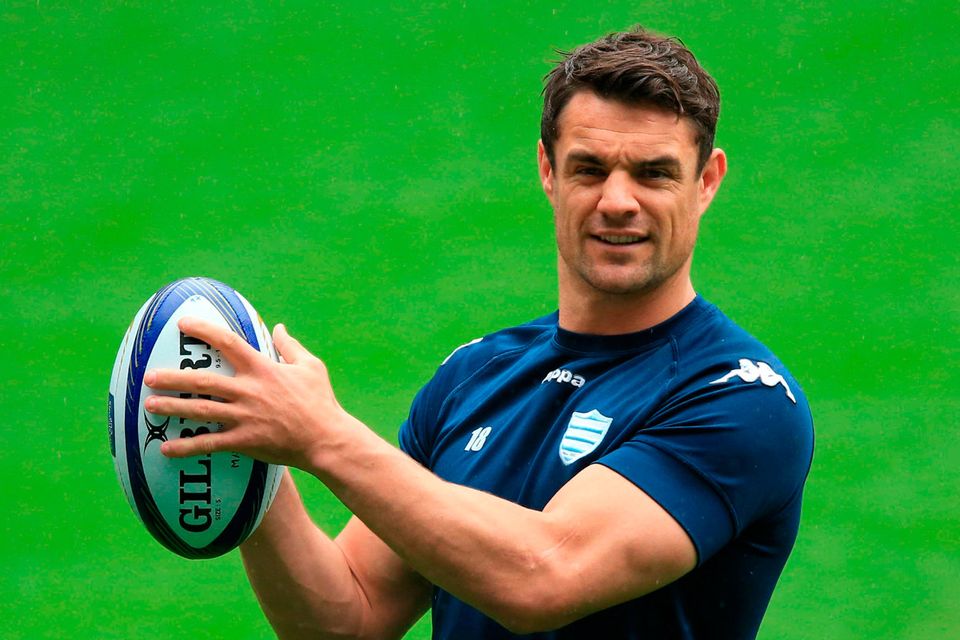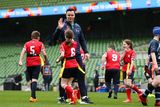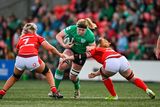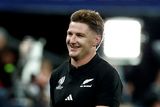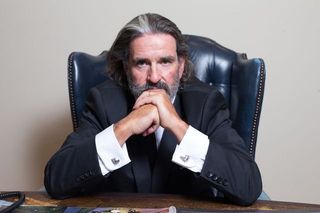Paul Kimmage: Pain-killing or performance enhancing? Latest allegations show rugby's blindspot
‘What we’re being told here is that Dan Carter was given corticoids to treat an injury. But these corticoids don’t treat it, they just ease the pain’. Adam Davy/PA Wire
Benezech says he was unwittingly and illegally administered cortisone at the World Cup in 1995. But cortisone is a fact of life for rugby players. It is not an anabolic steroid. It is an anti-inflammatory that eases the pain of an injury and brings down the swelling and bruising.
It is totally legal to take as long as it is declared by your team doctor and you're more than 24 hours out from a game. That's an IRB directive to stop players doing themselves damage by playing in a game and feeling no pain. Cortisone doesn't build an ounce of muscle, it doesn't contribute in any way to bodies getting bigger. It is on the banned list to save players from themselves.
Alan Quinlan 'The Irish Times', December 2014
Cheating was on the agenda that afternoon. It was lunchtime on a Friday in December, 2012 and I was chatting to Brian O'Driscoll about the 'Bloodgate' affair. "There's bending the rules and cheating. Bloodgate was just out-and-out cheating, and really wrong," he said.
"Is doping cheating?" I asked.
"Absolutely. There are two levels; I think someone that gets done for recreational is very different from someone doing performance-enhancing. I think performance-enhancing is a lifetime ban in any sport but again, there's different forms. There's cough medicine and there's juicing."
"How much juicing is going on?"
"I really don't know. But I definitely think that there's certain people that you look at and you really question."
"Is it a topic of conversation?"
"Occasionally . . . I see Armitage got off yesterday."
(The Toulon flanker, Steffon Armitage, had tested positive that summer in the Top 14 final.)
"Did he?"
"Yeah, I don't know the details."
"Wasn't it painkillers or something?"
"Morphine."
"I'd say the abuse of painkillers in rugby is massive," I observed. "I would have thought that was very much a doping offence."
"Would you?" he asked.
"Painkillers? Of course. The whole game is about confrontation and trying to get the ball. So if I can endure pain better than you . . . "
"I disagree," he said. "It's a game of skill. It's a game of intensity and an ability to be able to handle collisions and things . . . "
"Which is pain," I suggested.
"Which is pain," he agreed.
"And if you're taking something that suppresses that pain that's a performance-enhancement of sorts, isn't it?"
"Yeah, I suppose if you look at it that way."
"But it's not viewed that way?"
"No, it's not," he agreed. "And I would never have looked at it that way but I can see where you're coming from."
Laurent Benezech, the former French international, can identify with that blindspot. In July of '98, he was 32 years old and playing his rugby at Narbonne when the Festina doping scandal rocked the Tour de France and it got him thinking, for the first time, about the substances that were being abused in rugby.
"One of the interesting things about your brain is that you will refuse to see something obvious - even if it's in front of you - if you decide to," he says. "I created a world where I didn't have to think about it, because once you think about it, it's the end of the dream, or the beginning of the nightmare. I was never confronted with it and was able to protect myself by not thinking about it. I never had to answer the question. I could move around it."
Benezech retired from the game and tried to keep moving but the problem kept gnawing away at him: the players were getting bigger; the hits were getting harder; the game was getting faster; no one was asking questions. In March 2013, he called Laurent Telo, a journalist friend at Le Monde, and suggested they meet for a chat.
"I told him my concerns about the abuse of growth hormone and corticoids," he says, "but was conscious not to use the word 'dopage' because that's the trap. As soon as you mention doping, they [the governing body] say: 'We have no positive tests. There is no doping,' so the term I used instead was 'l'accompagnement medicalise' [medical assistance]."
But surely growth hormone was doping?
"Not for the player," he said, "because he's not positive after a test. That's the problem. I cannot use a word that has several definitions and for me, taking growth hormone is using a performance-enhancing medical aid, the same as the useless stuff like creatine and the useful stuff like EPO.
"It's more relevant for corticoids because, as you know, if you take them out of competition it's authorised but it's unauthorised in the 48 hours around a game. And taking corticoids is what? It's 'l'accompagnement medicalise de la performance' for sure, but is it doping? I don't know.
"And I didn't want to get stuck in that argument because my only goal in all this was the health of the players, and that has nothing to do with 'dopage' but it has a lot to do with taking drugs. Because when an athlete takes a sleeping pill, it's not supposed to be linked to performance, but it is. But try calling that dopage."
There is no mention of dopage in The Battle, the just-published autobiography of Paul O'Connell, but there are some interesting references to 'l'accompagnement medicalise'. The month is June, 2005 and he's on the training ground in Wellington:
"I'd never been as worked up in training - not even remotely close. But then I'd never taken something called Focus before putting on my boots. You could call it an energy drink, but that wouldn't cover it. It contained a massive hit of caffeine. Whatever you happened to be feeling at the time, whatever mood you were in, it exaggerated it."
The month is March, 2010, and he has strained his groin in the Six Nations game with Scotland: "I went for a scan, and they said the pubic symphysis muscle between my pubic bones was under stress. 'What we're going to do,' said the doctor, 'is inject your groin with some cortisone.'"
The month is January, 2011 and his knees are starting to ache from lineout jumping: "Towards the end of my career, for a Saturday game I took Difene on Friday and Saturday. It was a miracle drug, except it could disagree with my stomach. So I took Zoton, an indigestion tablet that dissolves on the tongue and lines the stomach. By kick-off the body felt - at least for a while - pretty much symptom-free. No aches, no pains, nothing.
"I was always conscious that anti-inflammatories needed to be taken in moderation. I hated it whenever I had to take Difene to play. Rugby needs to have expert vigilance over legal painkilling medication, because when people's livelihoods are at stake it's human nature that some will go too far and do themselves long-term harm chasing short-term goals."
The month is April, 2015 and he's thinking about the end and the price he has paid:
"There's a scene in Andre Agassi's book Open that has stuck with me. He was hobbling through a hotel lobby, a day after beating Marcos Baghdatis in five sets at the US Open. He was 36 and he'd been playing pro tennis for 20 years. His back was banjaxed. He needed cortisone shots to keep going. His father - who had been obsessed with making him the world's best tennis player since he was a small child - appeared from out of nowhere and grabbed his arm: 'Quit,' he said. 'Just quit. Go home. You did it. It's over.'"
As I write these words, there are 44 rugby autobiographies on the bookshelf to my left. Do any of these British or Irish players address the issue of doping in the game?
No.
The 'l'accompagnement medicalise?'
No.
The role doctors are playing?
No.
On Friday, a day after it was revealed that three of the world's best players - Dan Carter, Juan Imhoff, and Joe Rokocoko - had tested positive for a corticosteroid, O'Connell appeared on the Late Late Show. Was he asked about it? No. Was it addressed by Alan Quinlan in his column for the Irish Independent? No.
As usual, it was Benezech who stepped up to the plate.
"What this affair demonstrates is the sur-medicalisation and hypocrisy of this sport," he told Le Monde. "Because what we're being told here is that Dan Carter was given corticoids to treat an injury. But these corticoids don't treat it, they just ease the pain. They are a treatment for performance, not a muscle that has been damaged. So the player's health once again is put at risk - short term and long term."
But that's our blindspot. And not what we want to hear.
